|
A few weeks ago, the Pew Research Center released an article titled “Just one-third of U.S. Catholics agree with their church that Eucharist is body, blood of Christ.” Immediately after the study’s release, social media erupted with reactions of disbelief, shock, and anger, as well as theories of how to “fix this,” including greater catechesis and adjustments to our general liturgical practices. Despite the immediate reaction, there is no need for panic, as Christ assures the Church that “the gates of the netherworld shall not prevail against it,” (Matthew 16:18). Furthermore, jumping to such dire conclusions after one survey is not necessarily good pastoral or catechetical practice. As the Church examines the status of belief in the Real Presence and how to cultivate a greater understanding of that reality, she is also very aware of the need to deepen our encounter with Christ. As we ponder Christ’s presence in the Eucharist, we must ask ourselves if we have truly encountered him. In his encyclical letter Evangelii Gaudium, Pope Francis suggests that we “look at those first disciples, who, immediately after encountering the gaze of Jesus, went forth to proclaim him joyfully: ‘We have found the Messiah!’ (Jn 1:41).” In the end, how we catechize and what our liturgical practices are both require deeper reflection and greater discernment as to how God is calling us to use them as methods of ongoing conversion and evangelization. The doctrines and dogmas that we teach, how we celebrate the Mass, how we best serve our fellow man, are all likely to fall on deaf ears if they are not built on a deep and personal encounter with the Risen Christ. To examine this issue of Eucharistic belief, we should first look to chapter 4 of Christus Vivit, where Pope Francis reminds young people (and all of the people of God) that God is love, he saves us, he gives us life, and he is alive! If these four truths, which are expounded upon in good catechesis and experienced in their fullness in the Mass, are not understood deeply and intimately in the heart of every baptized Catholic, then moving forward will be extremely difficult. If I do not know Christ as the one who saves me, who walks with me through my life, as the one who gives me life, then why does it matter if it is truly his Body and Blood that I receive in its fullness at the Mass? Similarly, if we don’t understand the Kerygma—the mystery of the salvific work of God culminating in the passion, death, and resurrection of Christ—then how can we begin to understand the mystery of transubstantiation (CCC1376), especially when philosophical distinctions like matter and form aren’t in the everyday vocabulary of most Catholics? Pope Francis reminded pilgrims of this reality during a November 2017 General Audience when he said, “Every celebration of the Eucharist is a ray of light of the unsetting sun that is the Risen Jesus Christ. To participate in Mass, especially on Sunday, means entering in the victory of the Risen, being illuminated by his light, warmed by his warmth.” Pope Emeritus Benedict XVI famously wrote in his encyclical letter Deus Charitas Est, “Being Christian is not the result of an ethical choice or a lofty idea, but the encounter with an event, a person, which gives life a new horizon and a decisive direction.” I certainly don’t have the “easy fix” answer as to how to increase belief in the real presence in the Eucharist, but I heartily believe that it begins with a renewed sense of the encounter Pope Benedict XVI was writing about. We use the word “renewed” because even those of us who profess our faith in the Risen Lord are invited “to a renewed personal encounter with Jesus Christ, or at least an openness to letting him encounter them; I [Pope Francis] ask all of you to do this unfailingly each day” (Evangelii Gaudium). We must witness to the encounter that has given our lives “a new horizon and a decisive direction,” and share that with those whom we meet. When we accompany our brothers and sisters on their journey to know Christ more fully, we help them to encounter him in the way that the Holy Spirit guides them. If that encounter is through theological and philosophical distinctions, through service, through the liturgy, etc. then praise God, because it is through him that those are effective and not because of their own merits. As we continue to wrestle with this recent study and its implications, may we meditate on this: if we believe that the Eucharist changes us, strengthens us, heals us, then we must show it, we must witness to it authentically and humbly in all circumstances.
0 Comments
Over the last two weekends, in the midst of an ongoing sexual abuse scandal in the Church in the United States and throughout the world, I have had the privilege of concelebrating at three Masses of ordination of men I have known since their first month of college at The Catholic University of America due to my pastoral work there. They were also instrumental in the growth and development of the Catholic Apostolate Center in its early years. Deacon Alex Boucher of the Diocese of Portland, Deacon Joseph Hubbard of the Archdiocese of Boston, and Father Andrew St. Hilaire of the Diocese of Harrisburg, along with another Catholic University alumnus and Center colleague, Father Brett Garland of the Diocese of Columbus, who was ordained last year, are men of steadfast prayer, selfless service, and great integrity. They strive to live lives of joyful holiness.
Each of them, in their own way, has helped me to be a better priest and a better Pallottine. They and many young people who are devoted to Christ and his Church give me much hope, not only for the future, but now. I see it every day in ministry, especially with the Center team, many of whom witnessed along with me the ordinations of these men. Pope Francis has this hope as well when he says in his Apostolic Exhortation, Christus Vivit: “The Lord cannot fail in his promise to provide the Church with shepherds, for without them she would not be able to live and carry out her mission. If it is true that some priests do not give good witness, that does not mean that the Lord stops calling. On the contrary, he doubles the stakes, for he never ceases to care for his beloved Church” (275). Deacon Boucher and Deacon Hubbard will be ordained priests next year, God willing. Please keep them and Fathers Garland and St. Hilaire in your prayers as they minister to and with the People of God. May the Blessed Virgin Mary, Queen of Apostles and Mother of the Church, and St. Vincent Pallotti, zealous and faithful priest of the Diocese of Rome and Founder of the Union of Catholic Apostolate, intercede for them and for our Church! May the Charity of Christ urge them and us on! A little more than three years ago, I was asked to be the coordinator of my parish’s youth group. I had just begun college and taking on such a big responsibility seemed terrifying - it felt like I was trying to climb a very tall mountain and the top seemed impossible to reach. As I started this new position, I noticed that my group lacked organization, teen attendance, and the presence of trust because they did not know me as their leader. Working to create a semblance of routine and structure to use every Friday afternoon was probably the easiest thing to do, but attendance and building trust would need more work. We had about 4 teens that were committed to attending youth group every Friday. I asked myself, “How am I going to get more teens to attend? Where do I find them?” Another important question I asked was, “What will make them want to come back next Friday?” So, I got to work and created social media accounts under the group’s name to get the word out about our meetings. I spoke to the prayer group for adults that would meet at the same time and asked them to bring their teens to our group instead of leaving them at home. With a lot of prayer and thought, I realized that what these teens were lacking was an encounter with Jesus, so I would focus my talks on God the Father, Jesus, and the Holy Spirit. I also focused on doing group prayers where the teens had the opportunity to speak to God. As stated in Living as Missionary Disciples, “An encounter with the Lord brings about a profound transformation in all who do not close themselves off from him” (LMD 11). I witnessed this firsthand. Many teens started to come and seemed hungry to know more about God. Then came the third task: building trust. I noticed that these teens desperately needed someone to trust and wanted to be heard. Many times, we think that a young person has the perfect life. Most of these teens’ parents provide everything for them, including shelter, food, and clothing. It’s easy to think that all they do is go to school during the day and help around the house with a few chores. In reality, this isn’t true. I’ve come to learn that many of these teens experience peer pressure at school, have problems at home, and are constantly being bombarded with impossible standards on social media. The teens needed someone to walk next to them and listen to them. As Living as Missionary Disciples states, “The response to this encounter with Christ needs accompaniment” (LMD 14). The teens needed someone that would not judge them but instead be there for them. They needed to be able to be themselves and feel accepted the way they are despite their past or where they are now. As Living as Missionary Disciples also says, “We are not called to make judgements about others.” (LMD 15) Three years later, I have finished this pastoral ministry journey. I learned so much from the teens, such as the importance of having a personal encounter with God and the importance of accompanying the members of your ministry. Some tips I have for a pastoral minister include valuing the importance of constant prayer and regularly asking the Holy Spirit to come upon the ministry and give a vision of where to go and where to take the ministry. It’s also important to be able to recognize the needs of your community or within the demographic with which you are working and to be able to address those needs. There should also be a balance of “church work” and a healthy personal life. I personally lacked this balance and burned out, which led me to give so much and not take the time to give back to myself. Taking these measures will prevent the minister from burning out and help him or her be able to give more in the long run. For more tips on self-care visit our Self-Care for Healthy Ministry resource page. In AD 590, when a man named Gregory—the abbot of St. Andrew’s Monastery in Rome—was called upon to serve as Bishop of Rome, he responded with an open letter to the Church: "Pastoralis curae me pondera fugere" — “I have thought to flee from the burdens of pastoral care.” In essence, Gregory pleaded to be spared the heavy and awesome responsibility of the office of bishop. His letter formed the opening lines of his work Pastoral Care (Regula Pastoralis), one of our church’s greatest works of pastoral theology by one of our church’s greatest shepherds. Interestingly, we celebrate Pope St. Gregory the Great’s feast on September 3, the day he was consecrated pope — not the anniversary of the saint’s death, as per usual — perhaps as a testament to the light of personal holiness and institutional reform that he exhibited during the dark days, literally the historical “Dark Ages,” of the church when he was elected. Though primarily addressing his soon-to-be brother bishops in Pastoral Care, St. Gregory’s words resonate with all those who exercise leadership and responsibility in ministry, especially in light of the painful days in which our church now finds herself. In times of turmoil, St. Gregory believed that God calls all the baptized faithful — laity and clergy, women and men, young and old — to the task of renewal in the apostolate. St. Gregory did not mince words when he called out leaders “who aspire to glory and esteem by an outward show of authority within the holy Church,” and as a result, “when those who go before lose the light of knowledge, certainly those who follow are bowed down in carrying the burden of their sins” (Pastoral Care, I.1). He observed, “For no one does more harm in the Church than he, who having the title or rank of holiness, acts evilly” (Pastoral Care, I.3). St. Gregory’s great handbook on pastoral care challenges the core values and virtues that ought to shape our Christian life and community. In aspiring to roles of leadership, Gregory makes the striking remark that “whosoever was set over the people was the first to be led to the tortures of martyrdom” (Pastoral Care, I.8). In other words, Gospel ministry in the footsteps of Jesus, especially for those serving in leadership, is a laying down of one’s life — one’s time, talent, treasures — so that the power of the crucified and risen Christ may live in us. The result is not necessarily “success,” but joy and salvation. In imitation of Jesus, true pastoral care conquers the love of power with the power of love. In calling others to holiness, what made Gregory truly “great” was that in spite of his strengths, he never lost sight of his own weaknesses, sins, failures, and need for constant conversion. He ends his work by stating: “I, miserable painter that I am, have painted the portrait of an ideal man; and here I have been directing others to the shore of perfection, I, who am still tossed about on the waves of sin. But in the shipwreck of this life, sustain me, I beseech you, with the plank of your prayers, so that, as my weight is sinking me down, you may uplift me with your meritorious hand.” (Pastoral Care, IV) In short, we Christian brothers and sisters need each other more than ever. We need each other to offer joy, consolation, encouragement, and a helping hand to one another. That is what makes ministry not only possible, but even worth doing. We hold out hope that our God never ceases to call forth church leaders and Christ followers like Gregory to lead us through the Dark Ages, in whatever age they seem to be dawning. Today ends a yearlong celebration of the Jubilee of the 200th Anniversary of the Ordination to the Priesthood of St. Vincent Pallotti. In celebrations in 54 countries around the world and beyond, Pallotti’s foundation, the Union of Catholic Apostolate, is offering thanks for his life of selfless ministry. Ordained on May 16, 1818 as a priest of the Diocese of Rome, Pallotti served his entire life in the city, especially through pastoral care of the poor, sick, prisoners, and dying, spiritual direction, education, and sacramental ministry, particularly the Eucharist and Penance. Through reviving faith and rekindling charity as a priest always in collaboration with others, he was inspired 17 years later to found an association of lay people, religious and clergy that would assist the Church’s missionary efforts, revive the faith of Catholics, and live universal charity. He called it the Union of Catholic Apostolate. Only after almost 20 years of priestly ministry did he form a community of priests and brothers as well as a community of sisters. Both communities were small by the time of his death in 1850, but today are throughout the world. Fr. Jacob Nampudakam, S.A.C., the Rector General of the Society of the Catholic Apostolate (Pallottine Fathers and Brothers) in his book, The Spirit of the Priesthood according to St. Vincent Pallotti, summarizes well the way in which Pallotti went about his priestly ministry: “Vincent Pallotti from the very beginning of his priestly life, committed himself to live out all of the implications of the ministerial priesthood and revive its evangelical spirit. He interiorized the priesthood as a following of Jesus Christ and expanded his vision and put it into practice by means of priestly activities” (9). Pallotti in and through his priestly ministry lived the life of an apostle, a follower of Christ who is sent out into the world to share the Gospel in word and deed. As apostles, we are not alone, as Pope Francis notes: “I entrust all of you to the protection of Mary Most Holy, whom St. Vincent Pallotti venerated especially as Queen of Apostles. Her good example of apostolic zeal and perfect charity, invites us to pray without ceasing to invoke the gifts of the Holy Spirit upon the apostles of today, so that the Gospel of her Son can be proclaimed in every part of the world.” May the Charity of Christ urge us on! In Christ, Apostle of the Eternal Father, Fr. Frank
“But this I will call to mind; therefore I will hope: The Lord’s acts of mercy are not exhausted, his compassion is not spent; They are renewed each morning—great is your faithfulness!”
-Lamentations 3:21-24 Reflecting on the theme for this year’s Mid-Atlantic Congress—"Hope”—I feel as though the idea of hope seems a radical one to even consider today. Every morning, we’re confronted with more bad news: refugees, war, political espionage, starvation, violent crime, and even mass shootings in our own communities. It’s enough to make you throw up your hands and cry out, “Just make it stop!” And that’s exactly why we need hope. With the current state of the world, focusing on the theme of hope is one of the most important things we can do as a community of faith. We often hear that things are in crisis: the family, the Church, our nation, our whole world. But what we encountered at MAC this year looked nothing like crisis. In fact, it looked very much like hope. In our conversations with participants, the Catholic Apostolate Center staff witnessed a fire that, in charity and love, seeks to transform the world with the good news of the Gospel. And while it’s easy to get caught up in the excitement of being surrounded by passionate and hard-working people, there are ways we can carry that hope and momentum forward into our parishes and communities. The Catholic Apostolate Center participated in four presentations this year at the Mid-Atlantic Congress. In our presentation discussing Living as Missionary Disciples, the U.S. Bishops’ guide for pastoral planning, we were able to provide basic principles of missionary discipleship and evangelization. We talked about where the Church in the United States is heading with its evangelization and pastoral planning efforts and together brainstormed practical ways to implement these ideas in our own parishes and dioceses. By collaborating with other members of the Church, and helping to form missionary disciples, our work can change the narrative of hopelessness we often see in the world. The Center also engaged in fruitful conversation about how to equip young adults to enter into the mission the Church calls us to: becoming missionary disciples, or everyday evangelizers. The session highlighted work being done in several archdiocesan and post-collegiate formation programs, such as Apostles on Mission. We also reflected on the importance of fostering a greater sense of vocational discernment among young adults—a theme on which the Church will continue to reflect in the upcoming Synod on Young People, the Faith, and Vocational Discernment. Regarding our schools, the Center had the opportunity to reflect on the complexities of the role of principals as Lay Ecclesial Ministers. Acting as part-administrator, teacher, janitor, crying shoulder, cheerleader, and lunch monitor, a principal is also a school’s connection to the local parish and diocese. They take on a complex role in today’s world and, from the discussion in our session, are eager to renew their commitment to helping form the next generation of missionary disciples. Finally, the Center unpacked the idea of collaboration from the beginning as it can apply to pastoral planning. With so many new (rather, renewed) ideas being proposed by Pope Francis and the bishops, wrapping one’s head around the various buzz words, new terminology, or different pastoral methodologies can seem overwhelming. Our conversation touched on co-responsibility, missionary discipleship, and entering into pastoral planning with a spirit of discernment and collaboration. It was encouraging to see pastoral leaders rising to the challenge of being co-responsible missionary disciples ready to share the hope of Jesus Christ. At MAC this year, we experienced hope: hope in the Lord, hope that will not disappoint, and hope that sends us forth. We saw the excitement and fire that comes from hope, which will be taken home to our parishes, schools, and dioceses to transform the world. We thank all who engaged in conversation with us at MAC and challenge you to proclaim the hope of the Gospel to the world. To listen to our presentations from this year’s Mid-Atlantic Congress, please click here. “…the Church wants again to state her desire to encounter, accompany, and care for every young person, without exception.” -Pope Francis What is the role of youth and young adults within our Church? How can the Church better listen to their desires, dreams, and needs, and empower them as contributing members of the Body of Christ? What are young people seeking and how can the Church better minister to them during this transformative time in their lives? These are a few of the types of questions asked and discussed at the National Dialogue on Catholic Pastoral Ministry with Youth and Young Adults in Chicago from September 17-19. With representatives from almost fifty Catholic organizations, apostolates, and diocese around the United States, the National Dialogue brought pastoral leaders working with youth and young adults together in order to discuss the future of pastoral ministry to the young church. This dialogue was called for by the United States bishops and co-hosted with the National Federation for Catholic Youth Ministry (NFCYM) and the National Catholic Network de Pastoral Juvenil Hispana (LaRed). The National Dialogue was organized to unify, engage, and mobilize church leaders working with youth and young adults in preparation for the XV Ordinary General Assembly of the Synod of Bishops on “Young People, the Faith, and Vocational Discernment” called for by Pope Francis in Rome in October of 2018, as well as the V Encuentro called for by organizations advocating for Hispanic Ministry. According to their website, “The vision of this initiative is an energized and unified Church committed to forming and engaging youth and young adults as missionary disciples.” The Catholic Apostolate Center was honored to be invited to participate in the National Dialogue this year. As a ministry of the Society of the Catholic Apostolate (Pallottines) - Immaculate Conception Province founded in 2011 to respond to the needs of the church, the Center has worked with and for active young adult Catholics in a variety of ways. Most notably, the Center has developed the ten-week formation program Apostles on Mission in collaboration with the Archdiocese of Washington to help young adults become active evangelizers. As our patron, St. Vincent Pallotti, believed, we are all called to be apostles—what Pope Francis calls missionary disciples. Through efforts such as Apostles on Mission, as well as our online Catholic resources, webinars, podcasts, social media presence and blog, the Catholic Apostolate Center works to revive faith, rekindle charity, and form apostles across all ages and experiences within our Catholic faith. As Pope Francis wrote in the Preparatory Document for the 2018 synod, “Proclaiming the joy of the Gospel is the mission entrusted by the Lord to His Church.” We are excited to see how the collaborative fruits of the National Dialogue help us to fulfill that mission and continue to work to spread the joy of the Gospel each day. Those of us who are old enough to remember 9/11 typically have a vivid memory of what we were doing when the first two planes flew into the Manhattan World Trade Center. I remember that it was a cloudy, Texas heat-filled day. I was completing cross country practice in the back roads surrounding my high school in New Braunfels, Texas. The run felt a bit rushed since we only had two school periods for practice. Getting the news of the attacks also felt rushed as I was trying to get myself ready for class. It was eerie and unbelievable. Still, September 11, 2001 holds in my memory for the gravity of the attacks, the amount of lives lost and, more personally, because of where it led me in my own life. Before 9/11, I was simply a high school sophomore “figuring out who I was” and where I wanted to go to college. But afterwards, I started to think more about public service. Military service seemed like the best way, as I was familiar with it due to my dad's own military service. After some encouragement from family friends, I applied and was accepted to the US Air Force Academy. Upon graduation in 2008, I was commissioned a second lieutenant and began service as a communications officer. I served on active duty for six years, one tour in Iraq, and I continue to serve as a reservist. I am grateful for the opportunity I had to serve, for the people I encountered and how my military service has shaped me into the person I am today. I share my military service to paint another picture alongside the backdrop of so much grievance and loss caused by the 9/11 attacks. My story is not a common story among the American population. To this day, approximately only 7% of Americans have served in the military. And of that population, only 18% make up the post-9/11 veterans. But what is a common story is that among the men and women who chose military service, many feel their lifelong call is to serve others. While most Americans have been reading about it, those with military background have practiced a life of service that is indelible. The military trains and shapes you to protect the lives of your fellow man. As you go up in the ranks of the military, your greater responsibility is to be a leader who ensures their subordinates have the tools and training to get the mission done. This familiarity with and desire for a life of service among those in the military offers hope in the midst of such tragic events like the attacks on 9/11. As a result, veterans have been inspired to serve, even beyond military service. Those who come home from active duty are still seeking a mission to serve, and the Church is a good place to do just that. For some, religious life or the priesthood do not seem that far off. Others take leadership positions in their parish councils as lay members or advocate for the veterans to be welcomed into their local Catholic community. As you consider pastoral ways to remember 9/11, I encourage you to seek out veterans or those returning from military service in your community. These veterans can be a part of the hope in our world and help seek the good out of such loss. I invite you to enlist their support to organize a memorial prayer service in your local church. Beyond military veterans, we also see the other local emergency services who have also been greatly affected by 9/11. Don’t forget to include them in your outreach as well. Here are two practical suggestions on what to include in such a memorial prayer service:
To learn more about serving others through faith-based service opportunities, please visit the website of our affiliate, the Catholic Volunteer Network, by clicking here.
In my own prayer this summer, I’ve been using a collection of prayers from the great American Catholic writer, Flannery O’Connor. The prayers were part of a journal that was recently found among her papers. They are the prayers of a young struggling writer who wants her faith to inform her writing and her writing to be a work of faith. The collection is called A Prayer Journal.
In one of the journal entries she is writing about the importance of a thread in writing a novel. The thread, she writes is “a view of the world behind it & the most important single item under this view of [the] world is the conception of love—divine, natural, & perverted” (O’Connor 30). She continues to reflect on how many of our great writers, Freud, Proust, Lawrence “have located love in the human & there is no need to question their location; however, there is no need either to define love as they do—only as desire, since this precludes Divine Love, which while it too may be a desire, is a different kind of desire—Divine desire—and is outside of man and capable of lifting him up to itself” (O’Connor 30). O’Connor saw this way of defining love as primarily an emotion as a real problem for the modern heart, which was becoming increasingly “divorced from faith” (O’Connor 31). She writes “The modern man isolated from faith, from raising his desire for God into a conscious desire, is sunk into the position of seeing physical love as an end in itself” (O’Connor, 31). This, though written more than 50 years ago, is at the heart of the debate today on the definition and meaning of marriage. Recently, I was asked to be part of a panel at the Catholic Information Center reflecting on the impact of the Supreme Court’s decision to legalize same-sex marriage. I was asked to address the theological and pastoral implications of the decision. One of the pastoral implications is both a challenge and an opportunity to give witness to that which makes a sacramental marriage different. I suggest what makes a sacramental marriage different is the way in which the Church understands love. As Flannery O’Connor writes, the love we are called to share in marriage is a divine love. Married love is a self-sacrificing and self-giving imitation of Jesus’ self-giving love. The married love of man and woman couple is a visible sign for the world of God’s faithful and fruitful love. What made this presentation so interesting was the centrality of defining what love means and what love has to do with marriage. Please follow this link to view the complete presentation which includes President John Garvey of The Catholic University of America and Helen Alvaré, of George Mason University. Susan Timoney is Secretary for Pastoral Ministry and Social Concerns for the Archdiocese of Washington, teaches spirituality for Saint Joseph’s College Online, and a Catholic Apostolate Center Advisor. This blog post was first published on August 9th on the St. Joseph’s College of Maine Theology Faculty Blog. Click here to learn more about our cooperative alliance with St. Joseph’s College Online. The 3rd Annual Mid-Atlantic Congress for Pastoral Leadership (MAC) is set to take place in Baltimore, MD starting today, Thursday, February 27 and going until Saturday, March 1. For the second year in a row, the Catholic Apostolate Center will be playing a part in this gathering of pastoral leaders from around the mid-Atlantic region.
As part of our involvement with MAC, the Catholic Apostolate Center is a platinum sponsor of the event. Our Director Fr. Frank Donio, S.A.C. and advisor Barbara McCrabb will be doing a presentation on the New Evangelization through Collaboration. Fr. Frank will also be presenting with staff from the USCCB on the New Evangelization Toolkit. Additionally, the Catholic Apostolate Center staff will be exhibiting our resources in the exhibit hall. One special session that we will coordinate again this year is a series of Collaborative Conversations. This is a networking session, of sorts, that allows the participants to get to know each other, but allows them to get to have deeper conversations beyond the usual “What’s your name? Where are you from?” banter. During the Collaborative Conversations, participants are urged to discuss what they hope to get out of the conference and why they are attending as well as talking about greater issues facing them pastorally, in their churches, organizations, and schools. They are given the time, with a facilitator, to be able to talk about the good things that they are doing as well as taking some time to discuss the challenges that they face. Last year at MAC, I was fortunate to be able to watch the fellowship and brainstorming that occurred during the Collaborative Conversations. It was encouraging to see many different people from all over the country come together and share their experiences and learn from one another. It was inspiring to be a part of the little community that was formed over the few days of the Collaborative Conversations. We encourage you to join us at the Mid-Atlantic Congress this year! You can register for the conference here. Be sure to sign up for Fr. Frank and Barbara’s presentation on Thursday afternoon as well as the New Evangelization Toolkit Bootcamp session where Fr. Frank will be a part of the presentation team. The boot camp will take place before the conference begins on Thursday. We invite you to join us for the Collaborative Conversations session and be a part of the community this year. If you have already registered for MAC, but have not signed up for the Collaborative Conversations, you can contact the organizers at [email protected]. For more details on our work this year at MAC, click here . To read our current Catholic Apostolate Newsletter on MAC which highlights our resources on New Evangelization and Collaboration, click here. Monica Thom Konschnik is the Administraton & Finance Manager for the Catholic Apostolate Center. An excerpt from Cardinal Sodano’s homily, given this morning during the Mass for the Election of a Roman Pontiff (full text): Brothers and sisters in Christ today’s Gospel takes us back to the Last Supper, when the Lord said to his Apostles: “This is my commandment: that you love one another as I have loved you” (John 15:12). The text is linked to the first reading from the Messiah’s actions in the first reading from the prophet Isaiah, reminding us that the fundamental attitude of the Pastors of the Church is love. It is this love that urges us to offer our own lives for our brothers and sisters. Jesus himself tells us: “There is no greater love than to lay down one’s life for one’s friends” (John 15:12). The basic attitude of every Shepherd is therefore to lay down one’s life for his sheep (John 10:15). This also applies to the Successor of Peter, Pastor of the Universal Church. As high and universal the pastoral office, so much greater must be the charity of the Shepherd. In the heart of every Successor of Peter, the words spoken one day by the Divine Master to the humble fisherman of Galilee have resounded: “Diligis me plus his? Pasce agnos meos… pasce oves meas”; “Do you love me more than these? Feed my lambs… feed my sheep!” (John 21:15-17) In the wake of this service of love toward the Church and towards all of humanity, the last popes have been builders of so many good initiatives for people and for the international community, tirelessly promoting justice and peace. Let us pray that the future Pope may continue this unceasing work on the world level. Moreover, this service of charity is part of the intimate nature of the Church. Pope Benedict XVI reminded us of this fact when he said: “The service of charity is also a constitutive element of the Church’s mission and an indispensable expression of her very being; (Apostolic Letter in the form of a Motu Proprio Intima Ecclesiae natura, November 11, 2012, introduction; cf. Deus caritas est, n. 25). It is a mission of charity that is proper to the Church, and in a particular way is proper to the Church of Rome, that in the beautiful expression of St. Ignatius of Antioch, is the Church that “presides in charity” “praesidet caritati” (cf. Ad Romanos (preface).; Lumen Gentium, n. 13). My brothers, let us pray that the Lord will grant us a Pontiff who will embrace this noble mission with a generous heart. We ask this of the Lord, through the intercession of Mary most holy, Queen of the Apostles and of all the Martyrs and Saints, who through the course of history, made this Church of Rome glorious through the ages. Amen.
“God became man so that man might become God” ~St. Augustine, Sermo 13 de Tempore
I recently went to a Christmas open house at the home of my housemate’s parishioners. Like most events during our two years of service, heads turn when they see a group of four twenty-something year-olds enter the room where the median age is 60+. The questions start flying: “Who are you?” “Why are you here?” “You go to Notre Dame- did you watch the last game?” “Are you single?” “Have you met my grandson?” The one that always gets me is some form of, “…wait, you’re 23 and you want to be a practicing Catholic?” Many times, not wanting to get too deep too fast, I simply shrug and say “Yeah, I must be crazy but I love our faith.” This time, maybe due to the Christmas spirit in the air, I could not contain myself and I blurted out- “THE INCARNATION!” As the woman stared at me and my housemates continued the conversation, I was left thinking; how could someone not want to be Catholic when we have the doctrine of the Incarnation? How could I ever leave a faith where I am deeply loved, completely known, and have the ability to not only know God but bring about His Kingdom in the here and now? In just a few days at Christmas Mass we will hear the Word proclaimed and we will hear that this Word became flesh in the form of a babe. It is tempting for us to sit at Mass thinking of all the things we have going on that day: the food to cook, the family to visit, the last minute gift to buy for the cousin we forgot about. Yet, at Christmas Mass we are told of a most unique reality, that God became human! This is RADICAL. No faith outside of Christianity professes that God took on human form out of love to unite himself with his creation. The Pastoral Constitution on the Church in the Modern World writes that “by his incarnation the Son of God has united himself in some fashion with every human. He worked with human hands, he thought with a human mind, acted by a human choice, and loved with a human heart. Born of the Virgin Mary, he has truly been made one of us, like us in all things except sin” (Gaudium et spes §22) ‘ Because of the Incarnation, Christ knows us completely. He knows our pain, he knows how we feel, and he knows what it is like to endure the daily realities of being human. But the Incarnation goes beyond even this great gift. God, in becoming human, transforms human tasks that simply get us from point “A” to point “B,” to tasks that are doing the will of God and making God manifest. As St. Augustine puts it, "God became man so that man might become God". REJOICE this Christmas season for we are given the news that we can become God! In the humble birth of a babe, the Word became flesh and our lives were transformed! Live with the knowledge that you are deeply loved and act in such a way that God is made present- this is challenge the Incarnation gives to us. Let us accept this challenge and live our Catholic identity with great JOY knowing the truths that the doctrine of the Incarnation makes possible. Pam Tremblay is the Blog Editor for the Catholic Apostolate Center. |
Details
Archives
July 2024
Categories
All
|
About |
Media |
© COPYRIGHT 2024 | ALL RIGHTS RESERVED

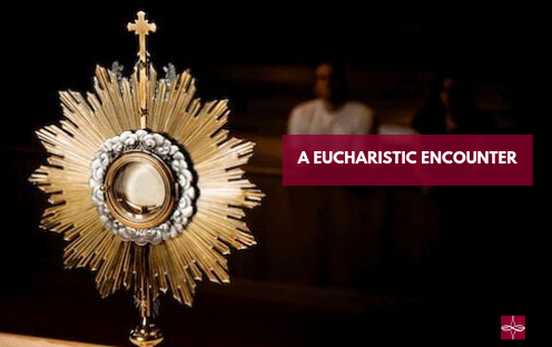

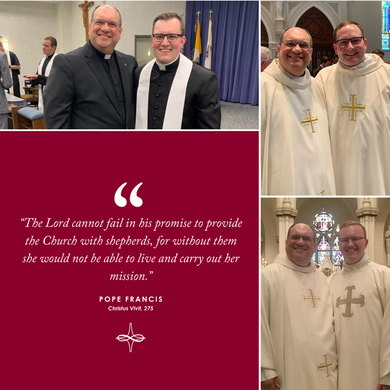
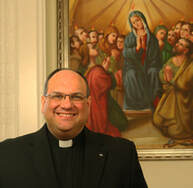

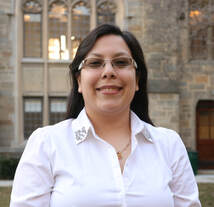
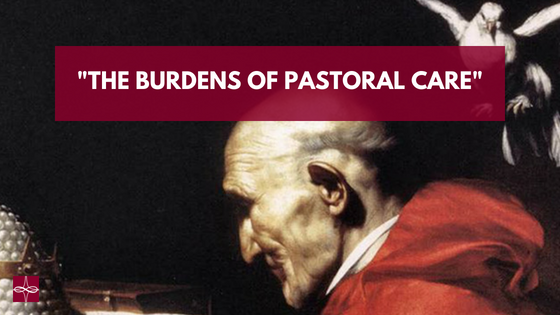

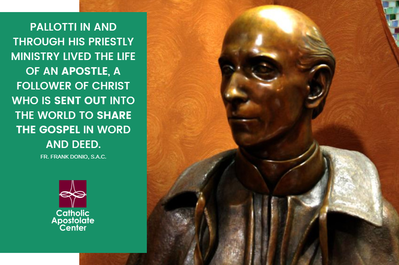
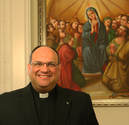

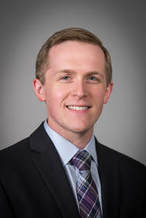


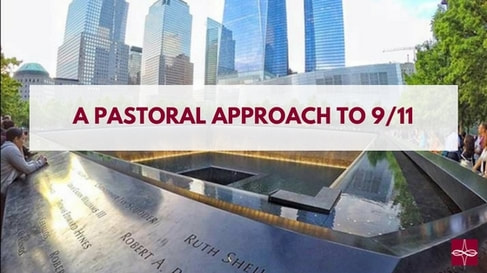


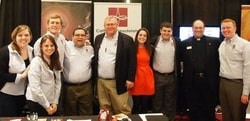
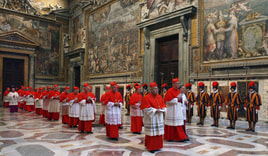
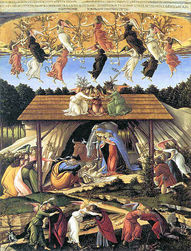
 RSS Feed
RSS Feed